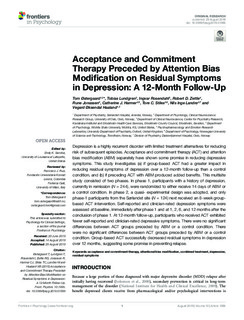| dc.contributor.author | Østergaard, Tom | |
| dc.contributor.author | Lundgren, Tobias | |
| dc.contributor.author | Rosendahl, Ingvar | |
| dc.contributor.author | Zettle, Robert | |
| dc.contributor.author | Jonassen, Rune | |
| dc.contributor.author | Harmer, Catherine | |
| dc.contributor.author | Stiles, Tore C | |
| dc.contributor.author | Landrø, Nils Inge | |
| dc.contributor.author | Haaland, Vegard Øksendal | |
| dc.date.accessioned | 2019-09-26T07:45:32Z | |
| dc.date.available | 2019-09-26T07:45:32Z | |
| dc.date.created | 2019-08-21T18:00:19Z | |
| dc.date.issued | 2019 | |
| dc.identifier.issn | 1664-1078 | |
| dc.identifier.uri | http://hdl.handle.net/11250/2618867 | |
| dc.description.abstract | Depression is a highly recurrent disorder with limited treatment alternatives for reducing risk of subsequent episodes. Acceptance and commitment therapy (ACT) and attention bias modification (ABM) separately have shown some promise in reducing depressive symptoms. This study investigates (a) if group-based ACT had a greater impact in reducing residual symptoms of depression over a 12-month follow-up than a control condition, and (b) if preceding ACT with ABM produced added benefits. This multisite study consisted of two phases. In phase 1, participants with a history of depression, currently in remission (N = 244), were randomized to either receive 14 days of ABM or a control condition. In phase 2, a quasi- experimental design was adopted, and only phase-1 participants from the Sørlandet site (N = 124) next received an 8-week group-based ACT intervention. Self-reported and clinician-rated depression symptoms were assessed at baseline, immediately after phase 1 and at 1, 2, 6, and 12 months after the conclusion of phase 1. At 12-month follow-up, participants who received ACT exhibited fewer self-reported and clinician-rated depressive symptoms. There were no significant differences between ACT groups preceded by ABM or a control condition. There were no significant differences between ACT groups preceded by ABM or a control condition. Group-based ACT successfully decreased residual symptoms in depression over 12 months, suggesting some promise in preventing relapse. | nb_NO |
| dc.language.iso | eng | nb_NO |
| dc.publisher | Frontiers Media | nb_NO |
| dc.rights | Navngivelse 4.0 Internasjonal | * |
| dc.rights.uri | http://creativecommons.org/licenses/by/4.0/deed.no | * |
| dc.title | Acceptance and Commitment Therapy Preceded by Attention Bias Modification on Residual Symptoms in Depression: A 12-month Follow-up | nb_NO |
| dc.type | Journal article | nb_NO |
| dc.type | Peer reviewed | nb_NO |
| dc.description.version | publishedVersion | nb_NO |
| dc.source.journal | Frontiers in Psychology | nb_NO |
| dc.identifier.doi | 10.3389/fpsyg.2019.01995 | |
| dc.identifier.cristin | 1717838 | |
| dc.description.localcode | © 2019 Østergaard, Lundgren, Rosendahl, Zettle, Jonassen, Harmer, Stiles, Landrø and Haaland. This is an open-access article distributed under the terms of the Creative Commons Attribution License (CC BY). | nb_NO |
| cristin.unitcode | 194,67,40,0 | |
| cristin.unitname | Institutt for psykologi | |
| cristin.ispublished | false | |
| cristin.fulltext | original | |
| cristin.qualitycode | 2 | |

